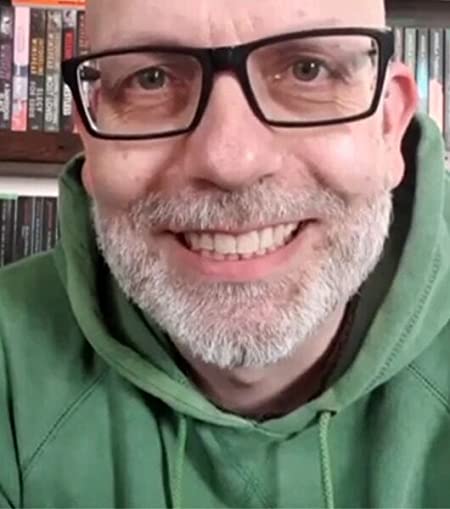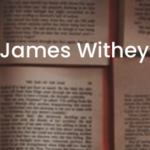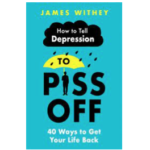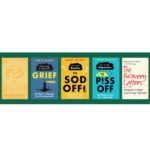The Wellbeing 5 Project
James Withey
Mental Health & Mental Illness Author
The Mental Wellbeing 5
5 Simple Questions to help with mental wellbeing with answers from Experts, Thought Leaders, Campaigners & Advocates
James Withey
James is a trained counsellor and mental health & mental illness author. His books include; How to Tell Depression to Piss Off, What I Do to Get Through: How to Run, Swim, Cycle or Sew Your Way Through Depression, How to Tell Anxiety to Sod Off (released in January 2022) and How to Get to Grips with Grief (released in July 2022).
How to Tell Depression to Piss Off provides 40 ways to get to a better place with depression. They are born out of James’ personal experience of clinical depression and his many years of working as a counsellor helping people with their mental health
James is the editor of “The Recovery Letters”, a collection of letters from people around the world living with depression, writing to those experiencing depression. He is the founder of “The Recovery Letters Project” which inspired the book and posts letter online.
James speaks about mental health to a huge variety of audiences (with a huge dollop of humour) including universities, mental health organisations & festivals, BBC Radio 4, BBC World Service, BBC Radio Sussex, Sky News and Dubai Eye Radio (amongst many others).
Find out more about James here

The Mental Wellbeing 5 with James Withey
1. What is your favourite quote, anecdote, proverb or experience that helps with mental wellbeing?
James: Maya Angelou’s ‘You did then what you knew how to do, and know that you know better, you do better’. It really helps with regret and looking at our past but also tells us how to live now, because all we can do is to try and navigate this complicated, topsy turvy life as best we can, moment by moment, trying to do the right thing.
2. What is your top piece of advice for mental wellbeing?
James: That our mental illness’ lies to us. Depression, anxiety, OCD, eating disorders etc are all fraudsters, fibbers and scammers. We shouldn’t believe what they say because they never have our best interests at heart. We delete the e-mails telling us that we’ve won £50 million pounds and all we need to do is send our bank details – we need to do the same with the negative, harassing messages our mental unwellness shouts at us. Instead, get angry with them, tell them to bugger off. Use that rage to not be held back, to not let it ruin your life and to prove that you are worthy, and capable and frigging awesome – because you are.
3. What is the one change in the world that you would like to see? (in your area of wellbeing or in the world in general or both)
James: More empathy; everyone really trying to feel what it’s like to be in another person’s shoes.
For people that judge and dismiss those of us with mental health problems, I would love to place them in my head for a day when I’m at my most unwell – to feel the excruciating pain, to see how difficult it is to manage each thought, tying to move through the mud of weariness, to understand what each one of us with mental health issues and mental illness deals with; I think then we would have more understanding. Now, obviously at the moment we aren’t able to inhabit other people’s bodies (maybe next year it will happen), so, for now, I’d love people to listen to us more; let us tell our stories. Don’t accuse of of being snowflakes or being overly sensitive or not being resilient enough – try and understand our pain.
4. Which resources (books / websites / videos etc) for wellbeing would you recommend?
James: For depression, Dr Tim Cantopher’s book ‘Depression Illness: The Curse of the Strong’, is a book I go back to time and time again. It set me on the right track to manage my depression when I was first seriously unwell.
I find Stanford University’s Professor Robert Sapolsky’s lecture on depression on YouTube incredibly validating and a great insight into the illness.
For my anxiety I find Pinterest really useful – perhaps not an obvious choice, as often social media often makes our anxiety much worse, but I fill each of my boards with beautiful things; paintings, ceramics, quotes, photos, favourite books, furniture, gardens, flowers, holiday destinations, remembered moments of joy and things that make me happy. It helps, it distracts me, grounds me and calms me.
5. What’s the one thing that always makes you smile?
James: I always, always smile when I see a dog running down the road with a stick twice it’s size in its mouth. In that moment, it’s the happiest being on earth. In the chaos of managing mental ill health, I try and do everything I can to have moments like that dog.
Further Exploration - James Withey

Website: James Withey
James' website containing information about him, his books, reviews, speaking, wiring & media appearances

Book: How To Tell Depression to Piss Off: 40 Ways to Get Your Life Back
James' book, How to Tell Depression to Piss Off providing 40 ways to get to a better place with depression. They are born out of James' personal experience of clinical depression and his many years of working as a counsellor helping people with their mental health

Books
Link to James' books including How to Tell Depression to Piss Off, What I Do to Get Through: How to Run, Swim, Cycle or Sew Your Way Through Depression, The Recovery Letters, How to Tell Anxiety to Sod Off (released in January 2022) and How to Get to Grips with Grief (released in July 2022).
Social Media - Follow James Below
Social Media - Follow The Recovery Letters Below
More Mental Wellbeing 5 Interviews Below

More Mental Wellbeing 5 Interviews
With answers from experts, thought leaders, advocates and campaigners to help with mental wellbeing



